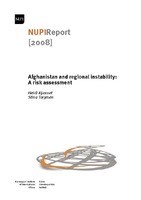| dc.description.abstract | The report offers a stocktaking of Afghanistan’s regional challenges. It finds
that domestic instability in Pakistan, strains in Pakistan–Afghanistan relations and insecurities
associated with the US–Iran stand-off on Iran’s nuclear programme continue
to pose the most significant regional risks to the stability of Afghanistan. There are, however,
a number of additional challenges: the failure of the USA and its allies to enable a
substantial dialogue on Afghanistan with Russia and China, in addition to India and Pakistan’s
continued rivalry, create a suboptimal regional environment for Afghanistan’s stabilisation
process. There are also serious regional challenges related to drugs trafficking and
water sharing. Finally, the report discusses the situation in two of Afghanistan’s (lesser
known) neighbours in detail. It finds that Uzbekistan is unstable: regime collapse in this
country is one possible scenario – and this would entail grave consequences for Afghanistan,
especially the northern regions. Turkmenistan, by contrast, whose long time dictator
Saparmurat Niyazov died in December 2006, seems stable in the short to medium term. The
report ends by providing a set of policy recommendations for Norwegian policymakers. |

